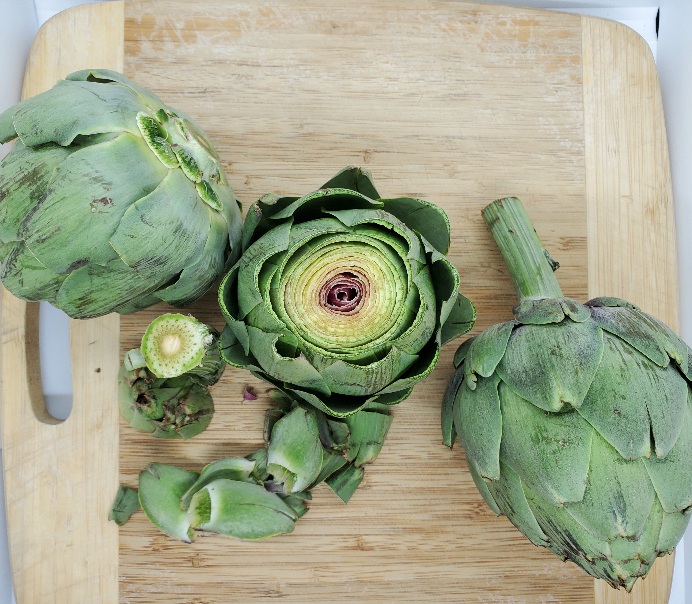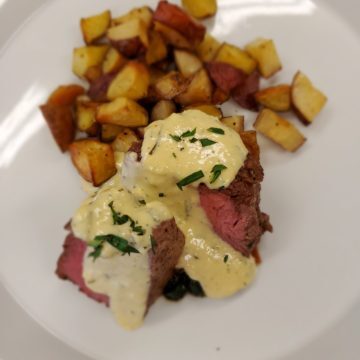
Under vacuum. This modern trend of cooking sous vide is a literal translation of the French phrase, under vacuum. Using a tool called an immersion circulator, foods are cooked in a controlled low oxygen environment at a lower temperature for a longer period of time. This method of cooking allows sensitive items like eggs, sauces, fish, meat, and much more to cook at a slower rate. Proteins bind, fats melt slowly and render, fish maintains moisture and flakiness, and meat evenly cooks to desired temperatures. Cooking is a series of controlled chemical reactions that we put together into something delicious and beautiful. Experience a variety of textures, a depth of marinated flavor, and a scientific approach to food preparation.

Eggs: Sous Vide
These eggs are cooked with the sous vide method to reach the most indulgent textured egg yolk and a white that is cooked yet soft and supple. These eggs are great for benedicts, ramen, pasta, soup, and so much more.
Equipment
- immersion circulator
- water bath stock pot or heat proof plastic tub
- heat protected surface
Ingredients
- fresh eggs check for cracks, shell impurities, or thin spots. Farm fresh is best!
- warm water
- salt
- baking soda
Instructions
- Fill a water bath with warm water to the required level for your immersion circulator. Place the bath on a heat-protected surface, affix the immersion circulator in the bath, set temperature to 145°F.
- Make sure you preheat the water before adding the eggs.
- Add in a pinch of salt and baking soda with the eggs once preheated.
- Cook eggs for 60-90 minutes at 145°F until it reaches your desired consistency.
- Crack the egg over a slotted spoon or strainer to remove the thin outer white. Place the egg gently in soup or over potato hash. The heat from the soup or hollandaise will firm up the inner white just lightly to provide texture.
- Enjoy the velvety jammy texture of perfectly cooked eggs.
Notes
learn more about sous vide egg cookery https://www.seriouseats.com/sous-vide-101-all-about-eggs
Sous Vide Egg Bites
waterbath eggs that have a silky texture, a great make ahead for those busy morning breakfasts or brinners.
Equipment
- sous vide waterbath setup with immersion circulator
Ingredients
- 1 dozen eggs farm fresh are best
- ⅓ cup plain greek yogurt whole milk preferred
- 3 cloves garlic
- ¼ cup your favorite toppings see notes for flavor combination ideas
Instructions
- Preheat waterbath for sous vide to 185°F.
- Prepare 8 oz wide mouth jars by oiling the inside, sanitizing the lids and rings.
- Layer in your favorite toppings, no higher than the ring line.
- Blend eggs, yogurt, seasoning, and garlic until smooth and a bit bubbly.
- Pour egg mixture in each jar up to the ring line.
- Wipe each jar top with a vinegar dampened towel to remove any oil or egg yolk. This will keep the water out of your jars and allow the lid to seal
- Affix the lids and rings to all jars and insert into waterbath, once heated, for 25 minutes.
- Remove jars from waterbath and allow to return to room temperature before chilling with the lid off in the fridge. Once completely cooled, reaffix the lids and rings and save for a quick bite.
- Re heat from 12 minutes in the oven at 400°F or in the waterbath at 190°F for 15-20 minutes.
Notes
Try flavor combinations like:Roasted Zucchini and Red PepperRoasted Broccoli, Green Onion and CheddarBacon, roasted summer squash, sweet corn and salsa verde with pepperjackSausage and Potato hash with SwissSpinach Artichoke with ParmesanConsider using this to use up leftover sides or veggies from a dinner or the last remaining half of a vegetable you didn’t need for a recipe.

Artichokes with Hollandaise
Whole fresh artichokes steamed with rich zingy hollandaise sauce. Try this classic fun appetizer as a date night experience!
Equipment
- blender
Ingredients
Hollandaise
- 10 Tbsp unsalted butter if using salted butter, skip the added salt
- 3 each egg yolks see how to separate eggs
- 1 Tbsp lemon juice
- ½ tsp salt
- ⅛ tsp cayenne optional
Artichokes
- 2 each Fresh artichokes look for bright colors and heavy feel
- 2 slices Lemon
- 2 each Bay leaf
- 2 each Garlic cloves
Instructions
Hollandaise Sauce
- Melt the butter on low in a small pot. Try not to let it boil—you want the moisture in the butter to remain there and not steam away.
- Add the egg yolks, lemon juice, salt and cayenne into your blender. Blend the egg yolk mixture at a medium to medium high speed until it lightens in color, about 20-30 seconds.
- Once the yolks have lightened in color, turn the blender down to its lowest setting (if you only have one speed on your blender it will still work), and drizzle in the hot melted butter slowly, while the blender is going. Continue to blend for another couple seconds after the butter is all incorporated. Take care not to blend too high or too long to over thicken.
- Turn off the blender and taste the sauce. It should be buttery, lemony and just lightly salty. If needed, you can add a little lemon juice or salt to taste.
- If you want a thinner consistency, add a little warm water. Pulse briefly to incorporate the ingredients one more time.
- Store until needed in a warm spot and use within an hour or so. Store any unused in an airtight container. Warm over a double boiler and blend on low until smooth once more.
Steamed Artichokes
- With a pair of kitchen scissors, snip off the tips of the artichoke leaves, they're sharp. With a super-sharp, heavy-duty knife, lop off the top of the artichoke – about 3/4 of an inch worth and cut off the stem at just below the base of the artichoke so that it will sit flat. Remove the bottom row of leaves. Rinse well under cold water.

- Fill a large pot with about two inches of water and set in the artichokes, bottom side down. Optional: add a bay leaf, a slice of lemon, and/or a garlic clove. Set on the stove and bring to a boil over high heat, then reduce the temperature on the water to medium, reducing it to a simmer.

- Cover and steam the artichokes for about 30-40 minutes, until tender. You can check for doneness by inserting the tip of a knife into the bottom (if it goes in with only a little resistance they're done) or by pulling off a tester leaf (it should come off easily). Remove from water, allow to cool a bit, and serve with warm hollandaise or garlic herb butter.


Sous Vide Beef Tenderloin
a simple method to infuse more flavor and fat into a lean but delicious piece of meat.
Equipment
- immersion circulator(sous vide setup)
- Cooking bag (vacuum, silicone, or otherwise sous vide approved bag.)
- saute pan or grill pan for searing
- tongs
- basting spoon
Ingredients
- 2 ea beef tenderloin
- 6 Tbsp butter or coconut oil, beef fat, or bacon fat
- 6 cloves garlic, smashed
- 2 sprigs fresh herbs try rosemary, thyme, sage, basil, oregano
- salt and peppercorn medley try an applewood smoked sea salt for a smoky indoor flavor without the grill.
Instructions
- Preheat the sous vide (immersion circulator) waterbath to 125°F for Rare- Medium Rare. 133°F for Medium. 140°F Medium Well. 149°F for Well Done.
- Portion clean, trimmed beef tenderloin into 3 inch tall portions. Tie with cotton butchers twine to hold the round medallion shape while cooking.
- Season Beef with salt and pepper on all sides.
- Place tenderloin and all other ingredients in a vacuum bag of your choice, remove most of the air from the bag.
- Place sealed bag in waterbath, double checking for water leaks, and cook for 2 hours and 30 minutes.
- Heat a cast iron saute pan or grill to a medium high heat. If doing so indoors on a stove, be sure to use a hood vent to not smoke out the house. Add a small amount of high heat oil to the pan, once heated just before searing.
- Remove the tenderloin from the bag, careful to reserve the aromatics, butter and juices inside. Sear beef on two flat sides until deep golden brown and carmelized.
- If searing in a sauté pan, add reserved juices and allow milk solids in the butter to brown. Baste meat by spooning buttery juices over the medallions until moistened.

- Remove meat and crispy garlic cloves from the pan, cut twine to remove from meat, and let rest for 15 minutes covered in foil.
- Slice, sprinkle with salt, and serve with your favorite seasonal vegetable sides and include the carmelized garlic for sweet punch of flavor.
Notes
Consider adding other seasonal flavors or spice this up with chile flakes. A great south american alternative cooking marinade would be a chimichurri sauce. Try pairing with sides like roasted root vegetable medley, fresh seasonal salads, or your favorite warm grains.
-
 Holy Mole! – Habanero & Ancho Hot Sauce$7.50
Holy Mole! – Habanero & Ancho Hot Sauce$7.50 -
 Tongue Thai’d – Thai Pepper & Ginger Hot Sauce$7.15
Tongue Thai’d – Thai Pepper & Ginger Hot Sauce$7.15 -
 Spicy Bison – Buffalo Style Hot Sauce$7.50
Spicy Bison – Buffalo Style Hot Sauce$7.50 -
 Farm Dust – All Purpose Seasoned Salt$4.25
Farm Dust – All Purpose Seasoned Salt$4.25 -
 Basil & Garlic – Seasoned Salt$4.25
Basil & Garlic – Seasoned Salt$4.25 -
 Hot Scot – Scotch Bonnet and Garlic Hot Sauce$7.50
Hot Scot – Scotch Bonnet and Garlic Hot Sauce$7.50 -
 A2/A2 Raw Cow Milk$9.00
A2/A2 Raw Cow Milk$9.00 -
 Half gallon RAW cow milk$8.00
Half gallon RAW cow milk$8.00 -
 VeggieBox: Summer ShareFrom: $38.00 every 2 weeks
VeggieBox: Summer ShareFrom: $38.00 every 2 weeks
